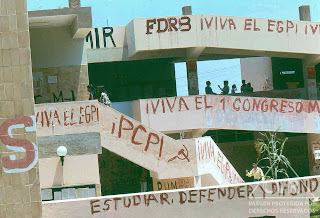There were just 4 commissioners, led by nun and human rights activist Else Monge Yoder, and supported by a variety of other specialists and interested parties. They have a very good website (in Spanish), where you can also download the entire final report.
Key findings:
- Between 1984 and 2008 there were 456 confirmed victims of human rights violations in Ecuador (clearly, there will have been more, but a TC always has budget and time limitations and is also only mandated to investigate particular crimes - in this case essentially murder, disappearance, and torture).
- Over half of these took place during the Presidency of León Febres Cordero in 1984-88.
- The Commission identified 32 instances of extrajudicial execution, 12 attempted homicides, 9 cases of forced disappearance, 214 illegal deprivations of liberty and 275 victims of torture.
- The report blamed police for 50 percent of human rights abuses, the military 28 percent, government officials 10 percent, court officials 6 percent and foreign agents 6 percent.
- The Commission found that the government consistently overstated threats from rebel groups and that the abuses were not isolated occurrences but part of a consistent counterinsurgency strategy.
Ecuador: Use Truth Commission Report for Practical Action (ICTJ)
Ecuador: Informe de la Comision de la Verdad identifica a 456 victimas (CNDDHH)
I didn't find much about this in the English-language media, just this rather curious report from the Associated Press. What really struck me was the way it used the phrase "so-called truth commission". I'm baffled. Considering it's now over 25 years since the Argentine CONADEP commission, and that since then, over 20 such commissions have conducted investigations (depending on how you define the commissions, etc), is there really still doubt over the term?! Also, take the first sentence:
A commission named by Ecuador's left-leaning government to investigate human rights violations in the previous quarter century on Monday blamed late right-wing President Leon Febres Cordero for two-thirds of such cases.This sentence may be purporting to merely fill in the political leanings of Ecuadorian regimes for the benefit of international readers who probably know little about the country, but it seems to me to contain a thinly-veiled suggestion that the report's findings are politically motivated. Anyway, here it is:
Ecuador panel blames 2/3 of abuses on '80s leader (AP)






